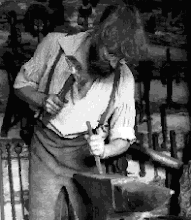Knowledge / Skill / Experience
This commentary is framed up against a number of similar first contact requests and questions I've had over the last month (especially).
"My 12 year old (son) has been watching 'Forged in Fire' and is keen to learn blacksmithing. Is there a one day course you teach?"
Or some variation on this theme.
No. No. No.
Right off:
Go and read 'Teens as Students'
then come back to the rest of this...
Knowledge can be had through study.
'Extensive research' is often suggested - this most commonly stated as 'hours spent on YouTube'. You watch 'Forged in Fire'? See my commentaries on that mess.
Problem there is complete lack of 'peer review' and commonly no attempt at all at to indicate the background of the presenter. Everyone is an 'expert', even if they don't actually have a clue! Status is indicated by 'click views' - not by actual achievement level.
(I went to YouTube, and did a general search using 'blacksmith knife' *)
See the title? FORGE a knife.
• The illustration of the forging process is only the first 5 minutes of a 25 minute video.
• The forging process illustrated are not so much wrong - as poorly carried out.
• The hammer technique used is horrible. Too heavy a hammer, grip choked up as a result. Thumb on top of the handle (will lead to tendon damage).
• The heat treating is effectively minimal, certainly not 'best practice'.
Ok, the presenter is attempting to simplify, de-mystify, encourage...
But :
• Briquettes are not the same as charcoal.
• Scrap wood will not produce effective forging temperatures
• Sure, you could use a small piece of scrap plate. Or a rock.
The core purpose of an anvil is *flat* and *stable*. None of the alternatives suggested are effective (even if that small plate had been bolted down to a wood stump - it would have been massively more effective!)
• A woodworking claw hammer? Seriously??
Sure, you *could*. (In Africa, I've seen video of using a fist sized rock as a hammer!)
There is a *reason* metalworking hammers are a different shape. **
• "I've only been forging for about 6 months"
Draw your own conclusion...
My overall recommendation:
• Do not start inside YouTube.
• Go to accomplished blacksmith's personal web sites.
See what kind of work they are able to create. How long they have been involved.
Find those with practical experience, proven ability : then look for those who may include tutorials.
• See recommendations on effective reference books for the novice blacksmith
Skill and Experience are somewhat linked.
But they are not exactly the same thing.
Skill is developed though simple repetition.
You have to do the thing, to become any good at the thing. Make 100 long points - and you will become effective at making long points.
Now just how fast a given individual will become effective at a physical task can vary a lot between individuals. Consider how long it took you to learn to ride a bike, or accurately throw a ball.
Experience is a wee bit different.
This is the 'well, that worked a lot better' factor. I can tell students that digging in the front of the hammer while making points will speed the process. How much to increase speed, but also not so much that you create creases you have trouble removing? Just exactly which hammer style and weight works best for you - for which forming step? An individual has to just get the feel for all this for themselves.
I normally suggest the most effective way for a new smith to progress is :
• take a basic course - by a well experienced instructor ***
(so you have some clue to what this is about and how to start)
• get simple working tools set up at home
•practice
• take another weekend course
• practice
• repeat, repeat
* Lest you think I am attempting to pick on specific individuals, these are the very first selections presented on the defined search.
** In the Royal Ontario Museum (Toronto) is an early Egyptian hammer for metalworking gold or copper. It is a square face with a cross peen, about the same size as the hammers I have in my shop. Date is roughly 3000 BC (predates human iron by at least 1000 years!)
*** Inside Ontario, there are three individuals who each have been teaching since the mid 1980's - and who continue to offer a range of weekend courses:
Obviously myself (!) at the Wareham Forge
David Robertson (www.artistblacksmith.com).
Robb Martin (www.thak.ca)
Both the others are also excellent teachers, and will approaches their programs (and content) a bit differently. Also a differnent range of scheduled dates that will give more options.








No comments:
Post a Comment